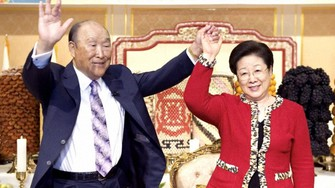
Unification Church founder Sun Myung Moon, left, and his wife Hak Ja Han are seen in an image from the Family Federation for World Peace and Unification's official YouTube channel.
The late Unification Church founder Sun Myung Moon said during a sermon in South Korea in March 1998 that people's savings in Japan were "for all of you," referring to church members, the Mainichi Shimbun has found during its analysis of 615 volumes of remarks made by Moon over 53 years.
-- Seeing Japan as a 'source of funds'
The Unification Church, now formally known as the Family Federation for World Peace and Unification, stresses that it currently views the relationship between Japan and South Korea as being "equal." Furthermore, Moon's sermons are "for reading, and are not used specifically as guidelines for followers," according to the group's public relations division in Japan. But the founder also made statements implying that the church's followers in Japan were to hand over their ancestors' bankbooks, suggesting that at the time he at least viewed the country as a source of income.
The statement regarding financial assets in Japan appeared in a volume of "The Sermons of the Reverend Sun Myung Moon," and was translated and confirmed by the Mainichi Shimbun.
The 615 volumes of sermons record Moon's remarks to followers in South Korea between 1956 and 2009. Each volume, now out of print and difficult to obtain, is 300 to 400 pages long. The Mainichi Shimbun confirmed Moon's remarks on a website that the Unification Church's public relations department in Japan accuses of "illegally reproducing" the entire collection.
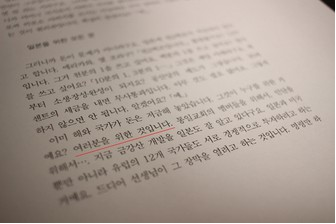
The image shows a portion of "The Sermons of the Reverend Sun Myung Moon," a collection of addresses by the Family Federation for World Peace and Unification founder given in South Korea. In one sermon, Moon told follower that savings in Japan were "for all of you." (Image partially modified) (Mainichi)
Page 36 of volume 305 records Moon as asking followers during a sermon in South Korea on March 29, 1998, "I've heard that there are 1.2 quadrillion in savings in Japan. Do you want to use a thousandth of that? Do you want to use a hundredth? How much do you want to use?"
The unit for the "1.2 quadrillion" was not supplied, but it is believed to refer to the amount of personal financial assets held in Japan. According to the Bank of Japan, financial assets in the business year ending in March 1998 stood at 1.286 quadrillion yen. At the time, these assets were attracting a great deal of attention from investors in Japan and overseas interested in a shift from mainly savings to investment.
A trending phrase the previous year in Japan was the "Japanese big bang," referring to financial system reform. Then Prime Minister Ryutaro Hashimoto proposed reviewing regulations to best make effective use of the country's 1.2 quadrillion yen in personal financial assets. Moon's statements hint at an interest in the investment-related "1.2 quadrillion yen in savings."
The religious group at the time referred to Japan as the "Eve nation." Using this term, Moon said, "The Eve nation has already saved money. Who is that for? It's for all of you, for all of the members of the Unification Church."
-- Unification Church denies Japan in subservient position
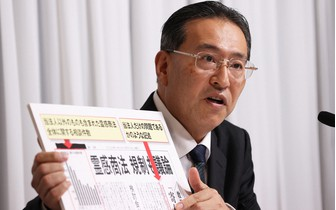
Hideyuki Teshigawara, who heads the Family Federation for World Peace and Unification's reform promotion headquarters, is pictured at a news conference in Tokyo's Shibuya Ward on Sept. 22, 2022. (Mainichi/Yohei Koide)
Observers have said that the religious group's doctrines formed the backdrop for its view of Japan as a source of funds. The doctrines compare the relationship between Japan and South Korea to Eve and Adam in the Old Testament of the Christian Bible. The church claimed that Japan was the "Eve nation" that invaded the "Adam nation" of South Korea, and that to atone for this, Japan had a responsibility to serve South Korea.
The current position of the Unification Church, however, is that this line of thinking has been revamped. Hideyuki Teshigawara, who heads the church's reform promotion headquarters, said at a news conference, "We now call South Korea the 'father nation' and Japan the 'mother nation.' The father and mother are basically in an equal relationship, and it's not a case of which one is higher and which is lower," denying that Japan was in a subservient position.
Moon does indeed state that the terminology of "Adam nation" (South Korea) and "Eve nation" (Japan) were changed to signify a "father" and "mother" relationship, but from the list of sermons, it appears there was no change in his view of Japan as subordinate.
On pages 170 and 171 of volume 370, Moon is quoted as saying on Feb. 19, 2002, "A long time ago we said 'Adam nation' and 'Eve nation,' but from 1978, we have recognized them as 'father nation' and 'mother nation.'" But after this, he suggested Japan needed to make sacrifices, saying, "The mother (Japan) must raise the sons and daughters (foreign countries). Accordingly, all Japanese women must reeducate the sons and daughters, even if they are all sacrificed. Then Japan will not perish."
He further said, "They are important members of the Unification Church," referring to Japanese people, at the same time he called for them to "shed sweat, tears and blood."
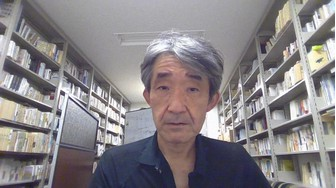
Kanazawa University professor Masaki Nakamasa is seen in this photo he provided.
Masaki Nakamasa, a professor at Kanazawa University who used to follow the church, commented, "Since the religious group has few followers in South Korea, it had to flatter Japan as 'mother country' so that the followers here, who provide money and human resources, could keep their pride. It's rephrasing the terminology to somehow make people see it as positive."
-- 'If you don't pay you won't be able to save your ancestors'
In the March 29, 1998, sermon in which Moon said that savings in Japan were "for all of you," Moon also made statements suggesting that the church was making references to ancestors when soliciting donations from its followers in Japan.
On pages 46 and 47 of volume 305, Moon is quoted as saying, "Money cannot sleep a night in the teacher's (Moon's) pockets. I have nothing now, right? My pockets are this empty, so I ask anyone to fill them."
He is then quoted as saying, "But that doesn't mean I'm asking for a 10,000-yen bill. I want you to put in the savings passbooks you inherited from your ancestors. Women of Japan, are you willing to do that?"
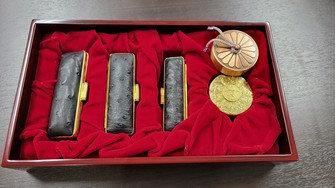
A set of seals that a unification church member purchased is seen in this image provided by Japan's National Network of Lawyers Against Spiritual Sales.
This is followed with the word "yes." Then Moon says, "If you don't give your savings passbooks inherited from your ancestors, you won't be able to save them," and, "Your ancestors are thinking, 'Oh, I want my family to also be able to receive a blessing (through donations)."
The statement from the group's founder, which could be perceived as a call for donations to the group for the "salvation of ancestors" is reminiscent of "spiritual sales" -- a marketing tactic to stir anxiety among followers by telling them that the cause of their misfortune is "ancestral karma" to get them to purchase expensive vases and other items.
Criticism of the Unification Church's spiritual sales erupted in Japan in the 1980s, and the issue developed into a social problem. In 2009, the president of a company under the religious group and others were arrested.
The church came under scrutiny again in July this year in connection with large donations it had been receiving, following the fatal shooting of former Prime Minister Shinzo Abe. The man accused of assassinating Abe said he resented the group after his mother made large donations to it. He is suspected of targeting Abe after learning the former prime minister had given a video message to a group closely associated with the Unification Church.
(Japanese original by Hiroyuki Tanaka, Digital News Center; and Hirohiko Sakaguchi and Chiharu Shibue, Seoul Bureau)
Source: https://mainichi.jp/english/articles/20221112/p2a/00m/0na/033000c